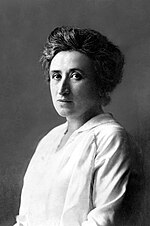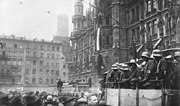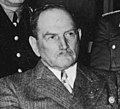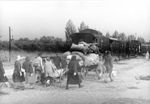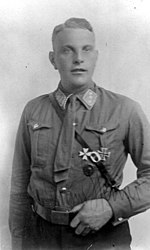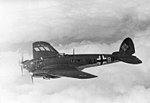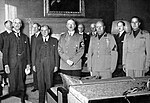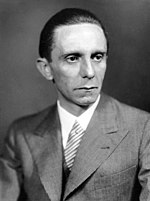Awards of the German Freikorps were unofficial military awards displayed by various veteran organizations in Germany during the immediate aftermath of...
5 KB (561 words) - 16:41, 7 September 2024
Freikorps (German: [ˈfʁaɪˌkoːɐ̯], "Free Corps" or "Volunteer Corps") were irregular German and other European paramilitary volunteer units that existed...
46 KB (5,177 words) - 13:05, 29 October 2024
The Sudetendeutsches Freikorps (SFK) (Sudeten German Free Corps, also known as the Freikorps Sudetenland, Freikorps Henlein and Sudetendeutsche Legion)...
106 KB (5,015 words) - 05:35, 21 October 2024
The German Legion of Honor was declared obsolete, along with all other awards of the German Freikorps, in 1933 by the new government of Nazi Germany. Recipients...
2 KB (223 words) - 17:31, 23 January 2024
The German Knight's Cross (German: Deutschritter-Kreuz) was an award of the German Freikorps which existed after the close of the First World War. The...
2 KB (278 words) - 23:06, 31 May 2024
Bug Star (category Military awards and decorations of Germany)
The Bug Star, more formally known as the Bug Star of the Schutztruppe Bug was a paramilitary award of the German Freikorps which was issued in the 1920s...
939 bytes (94 words) - 16:55, 23 December 2023
Sudeten German and Carpathian German Party (Sudetendeutsche und Karpatendeutsche Partei) in November 1935. With the rising power of Nazi Party in Germany, the...
13 KB (1,263 words) - 05:42, 21 October 2024
Silesian Eagle (category Military awards and decorations of Germany)
The Silesian Eagle (German language: Schlesischer Adler) was a medal awarded to members of the German right-wing paramilitary group Freikorps Oberland...
2 KB (178 words) - 01:41, 7 October 2024
April: Freikorps suppress communists in Brunswick. 27 April: Battle for Munich occurs between Communists and Freikorps units. 2 May: City of Munich taken;...
31 KB (4,109 words) - 01:43, 25 September 2024
Rosa Luxemburg (category People of the German Revolution of 1918–1919)
sending in the Freikorps, government-sponsored paramilitary groups consisting mostly of battle-hardened World War I veterans of the Imperial German Army. Freikorps...
110 KB (12,092 words) - 12:49, 21 October 2024
the Hep-Hep riots took place throughout Germany. During this time, many German states stripped Jews of their civil rights. As a result, many German Jews...
125 KB (15,281 words) - 08:52, 30 October 2024
Beer Hall Putsch (redirect from List of Nazis who died in the Beer Hall Putsch)
Member of the Freikorps, Nazi Party, and Sturmabteilung. Wilhelm Wolf, businessman and World War I veteran, born 19 October 1898. Member of the Freikorps and...
52 KB (6,148 words) - 14:10, 29 October 2024
Franz Ritter von Epp (category 20th-century Freikorps personnel)
After the end of World War I and the dissolution of the German Empire, Epp was a commanding officer in the Freikorps and the Reichswehr. His unit, the Freikorps...
17 KB (1,573 words) - 20:28, 21 October 2024
Nazi Germany, officially known as the German Reich and later the Greater German Reich, was the German state between 1933 and 1945, when Adolf Hitler and...
174 KB (20,513 words) - 05:08, 27 October 2024
Oskar Dirlewanger (category 20th-century Freikorps personnel)
participated in the suppression of the German Revolution of 1918–19 with the Freikorps in multiple German cities in 1920 and 1921. At the same time, he...
56 KB (6,247 words) - 23:32, 29 October 2024
ISBN 3-8258-9340-5 (in German) Google.de; accessed 6 December 2014. Hruška, Emil (2013), Boj o pohraničí: Sudetoněmecký Freikorps v roce 1938 (1st ed.)...
212 KB (25,274 words) - 17:39, 28 October 2024
Rudolf Berthold (category 20th-century Freikorps personnel)
Freikorps and fought in the Latvian War of Independence. Upon return in 1920, Berthold refused to disarm and together with his Freikorps joined the Kapp...
43 KB (5,994 words) - 20:08, 7 June 2024
Edmund Heines (category 20th-century Freikorps personnel)
Führer of the Munich Ortsgruppe, the local Freikorps Roßbach group. In December 1922, Heines became Member #78 of the National Socialist German Workers'...
18 KB (1,956 words) - 17:32, 21 October 2024
Ernst von Salomon (category 20th-century Freikorps personnel)
a German novelist and screenwriter. He was a Weimar-era national-revolutionary activist and right-wing Freikorps member. He was born in Kiel, in the Prussian...
8 KB (919 words) - 17:47, 25 August 2024
Wolf-Heinrich Graf von Helldorff (category 20th-century Freikorps personnel)
first and second class. After the war, he was a member of the right-wing Freikorps, seeing service with both the Freikorps Lutzow and Roßbach in 1919 and...
20 KB (2,183 words) - 16:20, 21 October 2024
served as the executive officer on a capital ship, hence often translated as commander Freikorps – volunteer corps (see Freiwillige). The Freikorps was an...
114 KB (14,098 words) - 13:30, 31 October 2024
Walter Caspari (category 20th-century Freikorps personnel)
July 1962) was a German military officer, policeman, and leader of a Freikorps militia unit named after him. Caspari was the son of Albrecht Caspari (1845–1927)...
5 KB (619 words) - 01:16, 16 March 2024
German rearmament (Aufrüstung, German pronunciation: [ˈaʊ̯fˌʀʏstʊŋ]) was a policy and practice of rearmament carried out by Germany from 1918 to 1939...
28 KB (3,518 words) - 22:50, 25 September 2024
Gustav Ritter von Kahr (category Victims of the Night of the Long Knives)
into Freikorps. After the suppression of the soviet republic at the beginning of May, during which about 335 civilians were killed by Freikorps fighters...
23 KB (2,675 words) - 13:51, 29 October 2024
Lithuanian–Bermontian War (category Pages using the JsonConfig extension)
Lithuania. At first, the German part of the army (Freikorps and the Baltische Landeswehr) was on the side of Latvia, even retaking Riga from the Bolsheviks in...
8 KB (803 words) - 19:27, 26 October 2024
Munich Agreement (redirect from Annexation of the Sudetenland)
respectively. Meanwhile, German forces conquered parts of the Cheb District and Jeseník District, where local battles included use of German artillery, Czechoslovak...
106 KB (12,861 words) - 14:25, 2 November 2024
but the Soviet Republic was put down on May 3, 1919 by the Freikorps. On 3 May 1919, loyal elements of the German army (called the “White Guards of Capitalism”...
19 KB (2,351 words) - 14:03, 9 August 2024
Silesian Uprisings (redirect from The Third Silesian Uprising)
to honour their German state social benefits, such as the old age pensions. However, many German Army veterans joined the Freikorps (Free Corps), a paramilitary...
46 KB (5,561 words) - 17:14, 23 October 2024
Fritz Ritter von Kraußer (category 20th-century Freikorps personnel)
Kraußer. After the end of the war, Kraußer took part in the suppression of the Munich Soviet Republic in 1919 as a member of the Freikorps unit headed by...
15 KB (1,489 words) - 17:08, 21 October 2024
Propaganda was a crucial tool of the German Nazi Party from its earliest days in 1920, after its reformation from the German Worker’s Party (DAP), to its...
85 KB (9,876 words) - 17:01, 26 October 2024








